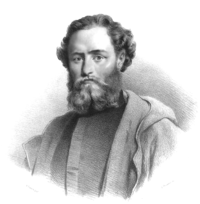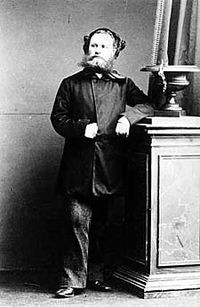- Ludwik Mierosławski
-
Ludwik Adam Mierosławski (Polish pronunciation: [ˈludvik mjɛrɔˈswafskʲi]; 1814, Nemours, Seine-et-Marne - 1878) was a Polish general, writer, poet, historian and political activist. Took part in the November Uprising of 1830s, after its fall he emigrated to France, where he taught Slavic history and military theory. Chosen as a commander for the Greater Poland Uprising of 1846, he was taken prisoner early but amnestied during the Spring of Nations. In 1848 and 1849 he fought for the insurgents in Baden and Electoral Palatinate. Afterwards he returned to France; he also had contacts with Italian activists like Giuseppe Garibaldi. He also took part in the January Uprising in the 1860s, as the first of four dictators of the Uprising.
Contents
Biography
Mierosławski was born on 17 January 1814 in Nemours, France, as a son of col. Adam Kasper Mierosławski (1785-1837), an officer of the Duchy of Warsaw and Polish Legions of the Napoleonic period) and aide to French general Louis Nicolas Davout, who became Mierosławski's godfather. His mother was of French origin, Camilla Notte de Vaupleux. His brother was Adam Mierosławski, an engineer and naval captain.
His family moved to the Congress Poland in 1820. Mierosławski attended schools in Łomża and Kalisz, and at the age of 15 he became a podchorąży (officer's candidate) in the 5th Infantry Pułk.
During the November Uprising, when Poles rose against the Russian forces in Congress Poland, he was a lieutenant serving under general Samuel Różycki. With him he fought and eventually retreated to Galicia, and later emigrated to France, where he became an active member of various Polish emigree organizations, particularly Polish Democractic Society and carbonari Young Poland.
In the years 1839-1840 he gave lectures on history of Slavic people in French Historical Institute in Paris; he was also considered by many among the Polish emigrants as a knowledgeable tactician and military strategist after the publication of a history of the November Uprising in Poland, Histoire de la revolution de Pologne (Paris, 1836-38). He also published several poems, but they were not considered very significant.
He was chosen as the leader of Greater Poland Uprising of 1846, but the leaders of the Polish Wielkopolska (Greater Poland) underground, including Mierosławski, were arrested by Prussian authorities. He was sentenced to death in December 1847 but was amnestied by Frederick William IV of Prussia during the Spring of Nations in March 1848.
In the next few years, he would act as the commander of the Greater Poland Uprising of 1848, chief of staff of the revolutionary Italian army in Palermo (Sicily) fighting against Bourbons (December 1848 - April 1849) and then commander of German insurgent units in Baden and Electoral Palatinate during the revolutions of 1848 in the German states. Eventually after most of the insurgent forces were defeated, he returned to Paris in 1849.
He vocally opposed the peaceful positivist movement, and supported the idea of another uprising in Poland. In 1860 Giuseppe Garibaldi nominated him for the commander of the International Legion in the Expedition of the Thousand which brought him back to Palermo.
In 1861 Mierosławski became a commander of Polish-Italian military school in Genoa. In 1863 he returned to Poland to join the January Uprising, where he became the first dictator of the Uprising. Eventually after suffering two defeats (battle of Krzywosądz and battle of Nowa Wieś), and political conflict with Marian Langiewicz, Mierosławski resigned as the dictator and returned to Paris. He would be a vocal critic of the preparation and organization of the January Uprising. He continuted to take part in politics of Polish emigrants, but he lost popularity.
After the changed political climate of Franco-Prussian War, due to his age as well as significant opposition and criticism from other emigree leaders, he retired from any active engagement in politics. He died on 22 November 1878 in Paris.
Works
- Autobiography (1841, under his mother's name)
- poems (various, particularly from 1830s to 1840s)
- Rozbiór krytyczny kampanii 1831 roku (Critical deconstruction of the campaign of 1831) - his most well known work, a military theory analysis of the November Uprising
He has also written other works of military nature, and published a diary in 1860s.
See also
References
- This article incorporates information from the revision as of 29 June 2007 of the equivalent article on the Polish Wikipedia.
External links
- Poles in European revolutions 1848-1849
 "Mieroslawski, Ludwik". New International Encyclopedia. 1905.
"Mieroslawski, Ludwik". New International Encyclopedia. 1905.
Further reading
- M. Zychowski, Ludwik Mieroslawski 1814-1878. Warsaw, 1963.
Categories:- 1814 births
- 1878 deaths
- People from Nemours
- Polish writers
- Generals of the January Uprising
- Greater Poland Uprising (1848) participants
Wikimedia Foundation. 2010.


